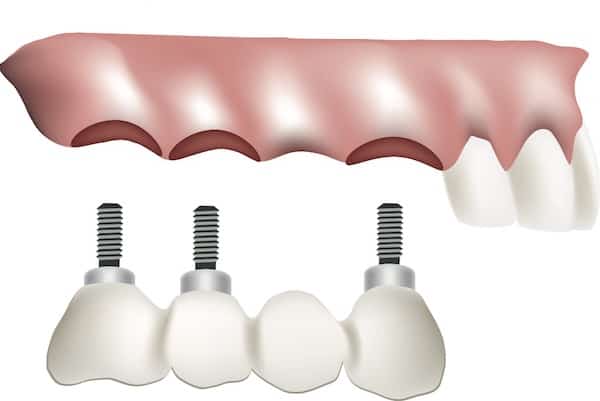Tooth Replacement West London
Gaps between teeth resulting from extractions can be filled by prosthetic replacement, in the form of dentures, bridgework, or implants.
A denture is a plate with a number of false teeth on it. It may be all plastic or a mixture of metal and plastic.
A bridge, as the term suggests is a way of closing the gap by anchoring crowns on the teeth adjacent to the gaps.
False teeth are attached to the crowns, which rest on the gum-line, forming a fixture over the gap.

Benefits of Tooth Replacement
Dental prosthetics are a substitute for your natural teeth and the tissues that surrounds them. Whether you are having dentures, a bridge or a single implant fitted, the process is generally known as tooth replacement. Ranging from a complete set that replaces all of your teeth, to partial dentures designed to replace only a few missing teeth.
Each tooth replacement case is treated on its own merit by Garden Square Dental, and so it is challenging to recommend any one particular treatment. The patient’s requirements are discussed with their dentist before any treatment is scheduled.
If missing teeth or decayed teeth are not replaced, it can cause further dental problems. These problems could be the spread of gum disease (periodontitis) and premature ageing. Premature ageing can be caused by the face muscles beginning to sag where there is no longer tooth and bone structure to support them.
Dentures can also help people regain their self-confidence after tooth loss, and a normal healthy-looking smile is attainable even by those with few or no teeth.
Dentures are easy to care for and require little maintenance to keep them in excellent condition, even over the long term.
Tooth Replacement FAQ’s
What types of prostheses can I get?
There are four main types of dental prostheses and the choice of which is correct for you can be decided after consultation with us — complete dentures where a full set of upper, lower or both sets of teeth are replaced. Apart from dentures, we can also produce a bridge, where your existing teeth are used as a support for the replacement tooth or teeth. This type of device offers more stability for wearers when chewing. Additionally, we can also provide tooth replacement for single and multiple teeth with the use of crowns, anchored into the mouth via dental implants ( See the crown section). We can also offer temporary dentures for cases where your mouth and gums are still healing, preventing a permanent solution, instead of providing you with a natural-looking temporary tooth.
If I have dentures will my eating habits need to change?
There are very few restrictions on what a denture wearer can eat, once you have been using them for a while you will begin to get an idea of how they feel when chewing different foods. If you do experience difficulty when eating come and see us for a solution as badly fitting dentures can contribute to sore gums and discomfort when eating.
Will I need to use a denture adhesive?
The dentures we produce are custom made for our patients and as a result, should not normally require the use of adhesive. If you have poor-fitting dentures please visit us for advice on how to reduce gum inflammation and irritation.
How long will my dentures last?
Dentures are produced from long-lasting hard-wearing materials and with good care can last for many years. However, they can discolour, break, or bend out of shape if not looked after correctly. We can advise you on the best ways to look after your replacement teeth and offer a regular denture checking service for patients.
Do I need my dentures replaced?
We advise that dentures should be serviced and refitted every few years to prevent the user suffering from sore or irritated gums. Older dentures can develop weaknesses that can result in fracture of the denture base or denture teeth. Visit our specialist for a check on the condition of your old dentures.

